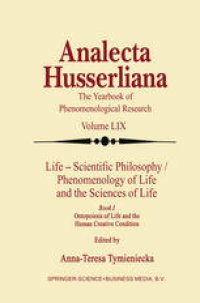
Ebook: Life Scientific Philosophy, Phenomenology of Life and the Sciences of Life: Ontopoiesis of Life and the Human Creative Condition
- Tags: Phenomenology, Philosophy of Nature, Philosophy of Biology, Modern Philosophy
- Series: Analecta Husserliana 59
- Year: 1999
- Publisher: Springer Netherlands
- Edition: 1
- Language: English
- pdf
This collection brings to the public the fruits of the groundlaying work on the philosophy/phenomenology of life presented in some 30 volumes of the Analecta Husserliana, and inaugurates a new phase in philosophy/phenomenology - a truly radical turn.
As Tymieniecka in her introduction puts it, the time is ripe to abandon the prejudices against empiria and set aside in a `second position' the epistemological/constitutive criterion of validity and truth - without, however, abandoning it. To the contrary: recognising with our present culture the overwhelmingly superior validity of the pragmaticity test, which science indubitably applies in its `verification' of technology, philosophy/phenomenology at last reaches the full significance of reality: the fullness of the vital fact of life, which comprises not only the works and enjoyment of the mind and the spirit, but those of the bios and the cosmos too.
The full-fledged dialogue with the hard-core sciences opens up; philosophy of life and the human creative condition draws together all the radiations of life into its field of inquiry. Tymieniecka thus proposes a new mathesis universalis - the dream of Leibniz and Husserl - which can at least be fulfilled.
This collection brings to the public the fruits of the groundlaying work on the philosophy/phenomenology of life presented in some 30 volumes of the Analecta Husserliana, and inaugurates a new phase in philosophy/phenomenology - a truly radical turn.
As Tymieniecka in her introduction puts it, the time is ripe to abandon the prejudices against empiria and set aside in a `second position' the epistemological/constitutive criterion of validity and truth - without, however, abandoning it. To the contrary: recognising with our present culture the overwhelmingly superior validity of the pragmaticity test, which science indubitably applies in its `verification' of technology, philosophy/phenomenology at last reaches the full significance of reality: the fullness of the vital fact of life, which comprises not only the works and enjoyment of the mind and the spirit, but those of the bios and the cosmos too.
The full-fledged dialogue with the hard-core sciences opens up; philosophy of life and the human creative condition draws together all the radiations of life into its field of inquiry. Tymieniecka thus proposes a new mathesis universalis - the dream of Leibniz and Husserl - which can at least be fulfilled.